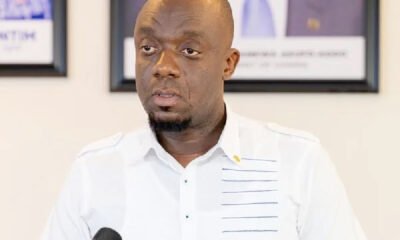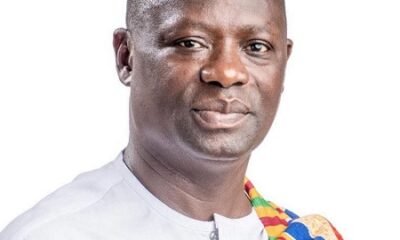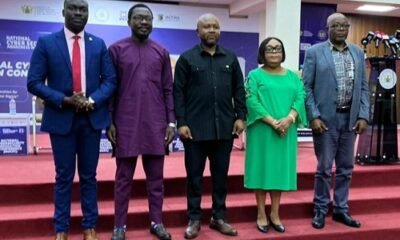News
Deputy Minority Leader declines ECOWAS Parliament nomination, cites lack of consultation
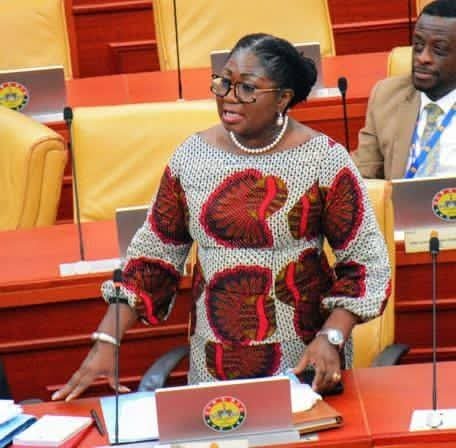
The Deputy Minority Leader in Parliament, madam Patricia Appiagyei, has turned down her nomination to represent Ghana at the ECOWAS Parliament.
In a memorandum directed to the Speaker Alban Bagbin, she said the decision to include her was made without her knowledge or consent, and described it as a calculated attempt to replace the Minority Leader while creating division within the caucus.
This follows concerns raised by the Majority Leader in Parliament on Tuesday , July 22, 2025.
The Majority Leader, Mahama Ayariga argued that the ECOWAS Parliament was pushing for 30 percent female representation hence it was customary for deputy minority leaders to be part of the delegation.
He therefore suggested that madam Appiagyei replaces Minority Leader Alexander Afenyo-Markin in the newly reconstituted list.
This notwithstanding, madam Appiagyei, in a memo to the speaker, said she was not consulted and had never agreed to replace her leader.
The deputy minority leader revealed that she was surprised that such a proposal was made in her absence and that of the minority leader.
According to her, there had been a clear understanding that Afenyo-Markin would continue serving on the ECOWAS Parliament, and this had been communicated to the committee of selection.
She described the move as procedurally wrong and legally flawed.
Madam Appiagyei explained that Afenyo-Markin had been sworn in as a Member of the ECOWAS Parliament and later elected Deputy Speaker.
She said under ECOWAS law, a member’s term lasts four years unless they resign, leave Parliament, or become ineligible.
Since none of those conditions apply, she believes there is no justification for his removal.
She added that replacing him without proper cause would breach ECOWAS statutes and Ghana’s parliamentary procedures.
While supporting the call for more women in regional bodies, she called for due process to be followed.
“Using gender parity as a reason for irregular decisions undermines both the goal and the integrity of Parliament,” she noted.
She officially declined the nomination and urged that her name be removed from the list sent to ECOWAS.
She also asked the Clerk of Parliament not to communicate any resolution that includes her name.
She called for the original list of nominees to be maintained to preserve unity in the house and avoid public embarrassment.
The original nominees include Alexander Afenyo-Markin, Kwame Anyimadu Antwi, and Bryan Acheampong.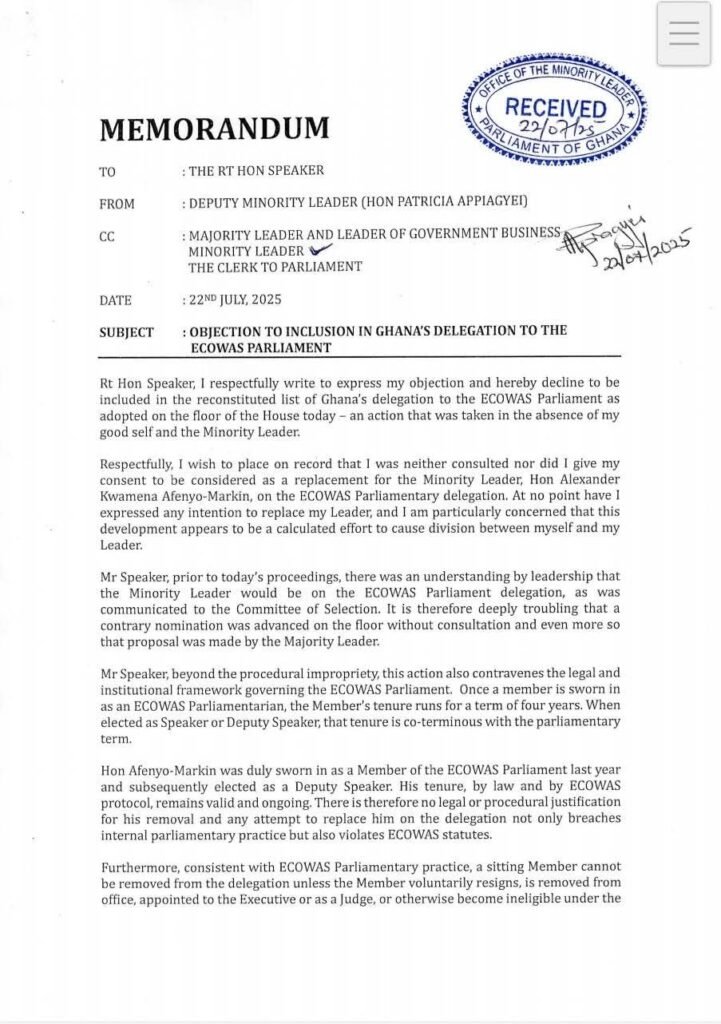
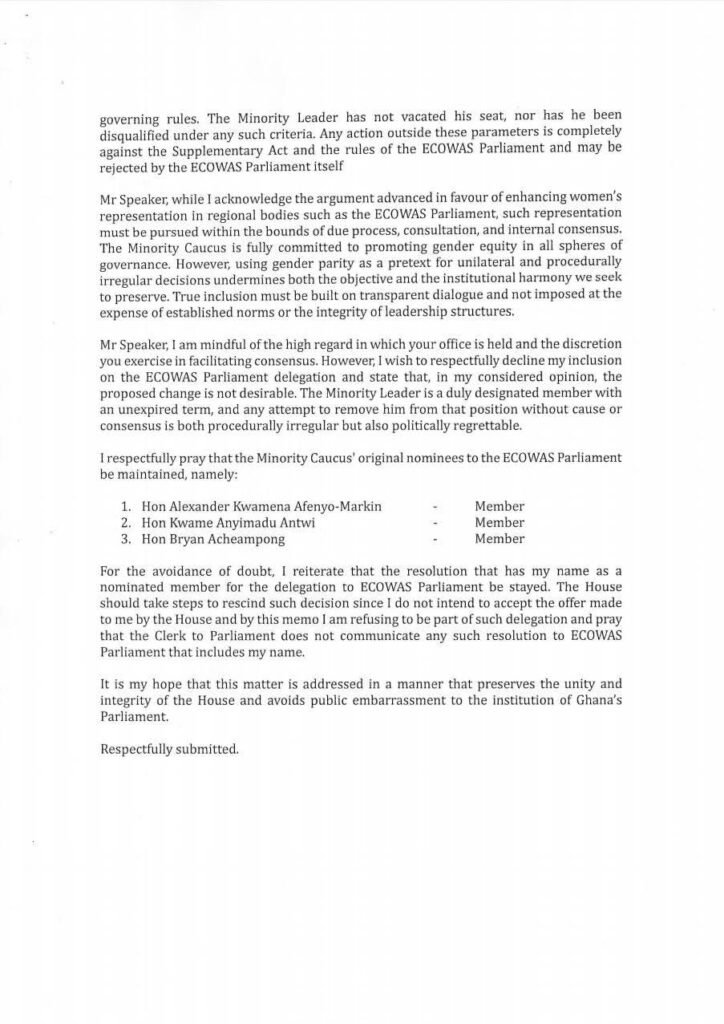
Jacob Aggrey
News
NPP Will Surely Return to Power in 2028 — Justin Kodua Declares, Accuses Mahama Government of State-Sponsored Persecution
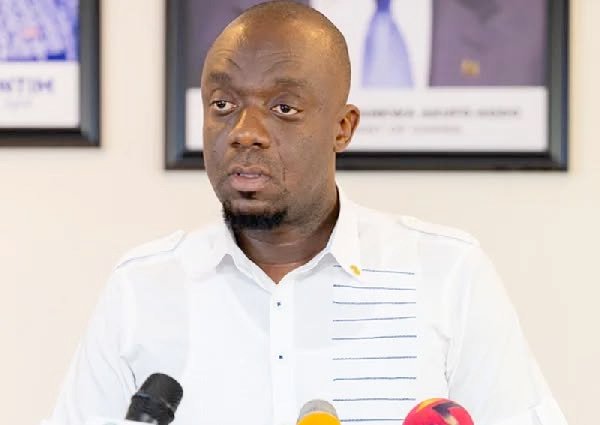
The General Secretary of the New Patriotic Party (NPP), Justin Frimpong Kodua, has expressed confidence that the party will return to power in December 2028, promising that the NPP will present a stronger, united front to the Ghanaian people.
Speaking at a press conference at the party’s headquarters, Mr. Kodua assured members and supporters that despite current challenges, the NPP remains the best option for Ghana’s development.
“We have more than three years to preach to Ghanaians our record and what the New Patriotic Party stands for. I can assure you, issues of apathy and reconciliation will all be addressed. Inshallah, come December 7, 2028, the New Patriotic Party will surely come back to power,” he declared confidently.
Mr. Kodua also used the platform to criticize the John Mahama-led government, accusing it of persecuting NPP members through the abuse of state institutions.
According to him, the ruling National Democratic Congress (NDC) government has “weaponised” state security agencies and the judiciary to target political opponents, describing the situation as a dangerous threat to Ghana’s democracy.
He said the NPP had on several occasions held demonstrations and press conferences to remind the government that Ghana is a country governed by the rule of law, but such calls have gone unheeded.
“Unfortunately, our calls have fallen on deaf ears, but as a party, we shall not back down on our resolve to fight this injustice,” he said.
Mr. Kodua cited instances where NPP members have allegedly been detained beyond the lawful 48-hour limit and subjected to excessive bail conditions.
He stressed that these actions violate Article 14 of the 1992 Constitution, which guarantees that any person arrested or detained must be brought before a court within 48 hours or released on reasonable terms.
He further noted that the practice also contravenes Section 96 of the Criminal and Other Offences Procedure Act (Act 30) and several Supreme Court decisions, including Martin Kpebu vs. Attorney-General, which emphasize that bail must not be punitive or unreasonable.
“Under President John Mahama’s administration, a person is rather presumed guilty until proven innocent. This level of selective justice and intolerance of dissent is eroding public confidence in Ghana’s democratic and judicial systems,” he lamented.
Mr. Kodua described as alarming the growing “culture of silence,” where citizens are allegedly targeted for expressing dissenting opinions on social media, warning that it poses a threat to the nation’s democratic gains.
He reaffirmed the NPP’s commitment to defending justice and freedom, insisting that the party will not relent in protecting the rights of its members and all Ghanaians.
“The repercussions of this culture of silence are dangerous. It reverses the democratic progress we’ve made as a country,” he warned.
In a more hopeful tone, Mr. Kodua announced that the NPP would soon resume issuing membership cards to strengthen its grassroots organization ahead of the 2028 elections.
“I’m happy to announce that starting next week, we’ll continue with the issuing of membership cards to our members,” he said.
He ended his address by reiterating his belief that the NPP will return to power in 2028, saying Ghanaians have experienced both major political parties and can clearly see the difference.
“Ghanaians have tested both the NPP and the NDC, and I tell you, the difference will be clear. The New Patriotic Party will surely come back to power,” he concluded confidently.
— By Jacob Aggrey
News
Armah-Kofi Buah Leads Ghana’s Delegation to COP30 in Brazil
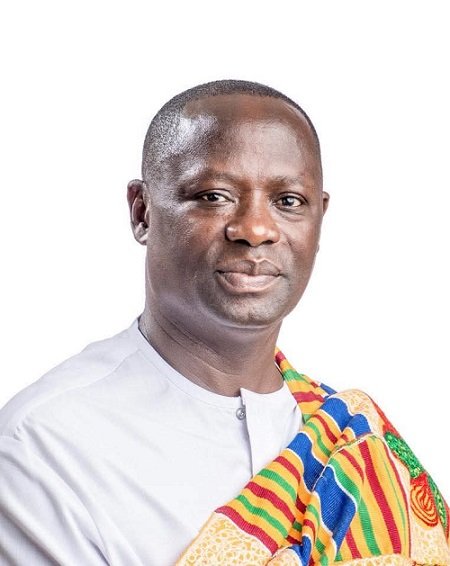
The Minister of Lands and Natural Resources and Acting Minister of Environment, Science and Technology, Emmanuel Armah-Kofi Buah, has arrived in Brazil to lead Ghana’s delegation to the 30th United Nations Climate Change Conference (COP30).
The global climate summit is being held in Belém, a city in northern Brazil, where world leaders, negotiators, civil society groups, and environmental experts are meeting to discuss major decisions on climate action, nature conservation, and sustainable development.
As head of Ghana’s delegation, Mr. Armah-Kofi Buah is expected to deliver Ghana’s national statement at the Summit of Heads of State on Thursday, November 6, 2025, on behalf of President John Dramani Mahama.
His speech will highlight Ghana’s key climate priorities, commitments, and expectations for global cooperation.
The Acting Minister and his team will also participate in negotiations, ministerial dialogues, and other scheduled activities throughout the two-week conference, which runs from November 6 to November 21, 2025.
According to the Ministry of Environment, Ghana’s participation in COP30 underscores the government’s strong commitment to protecting the environment, promoting climate resilience, and building strategic partnerships with other countries to tackle global environmental challenges.
The Ministry added that Ghana will continue to use international platforms such as COP30 to share knowledge, engage in meaningful dialogue, and strengthen cooperation for sustainable development.
— By Jacob Aggrey

